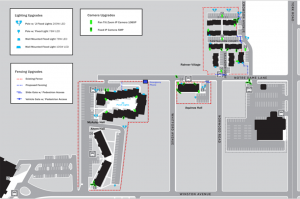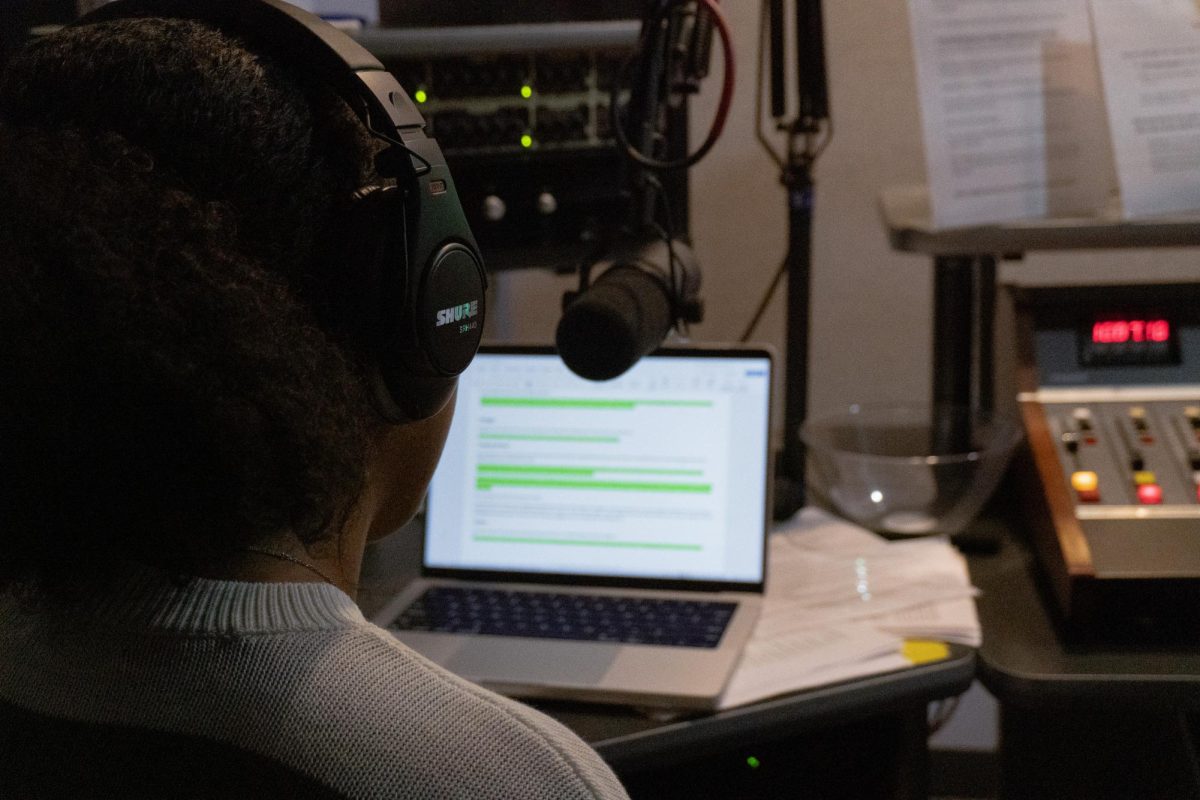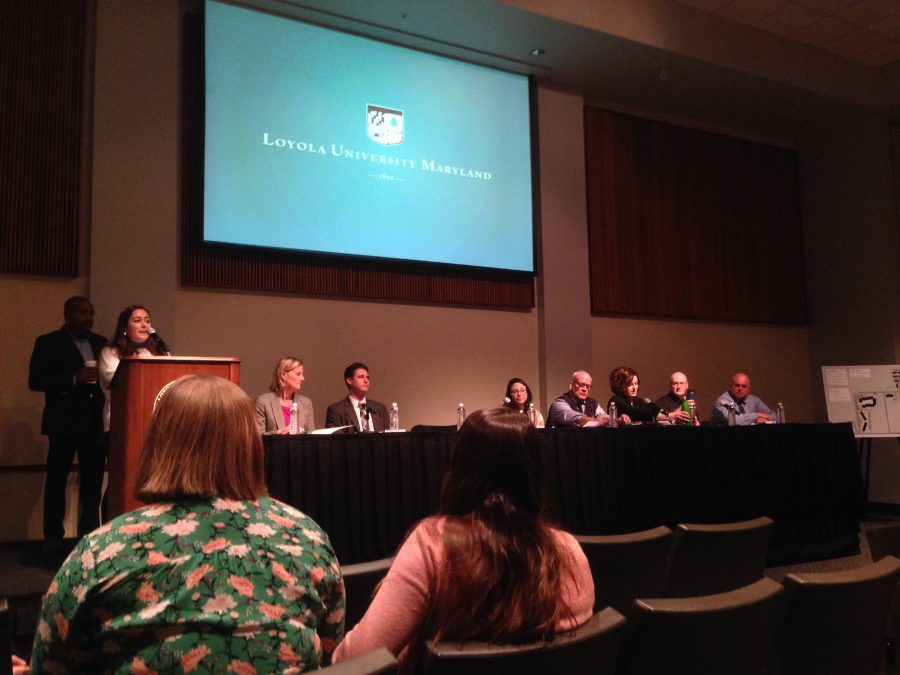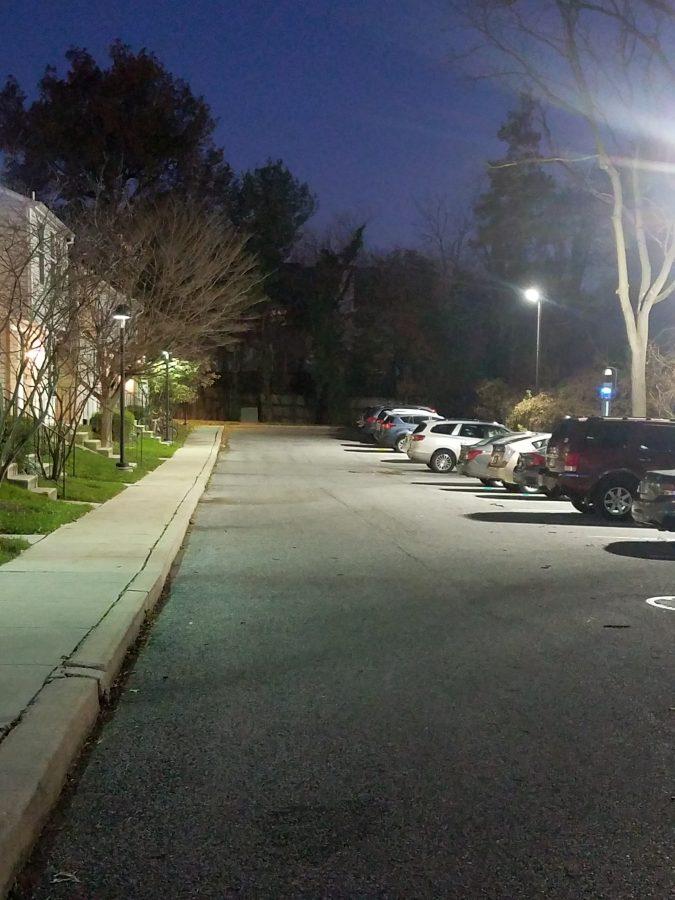In the wake of the Notre Dame Lane carjacking that occurred in early October, public safety has been a topic on the minds of many in the Loyola community, with both concerned students and parents eager to see change in the way safety is addressed on campus. Concerns over safety infrastructures on Eastside and the campus as a whole have been evaluated and addressed by the Administration, with new additions beginning to take place.
Last week on the evening of Nov. 27 in McGuire Hall, a Town Hall on public safety, presented by the Student Government Association (SGA), was held to give Public Safety and the Administration the opportunity to present the new additions they’re making to campus safety amenities. A question-and-answer session followed.
The Town Hall was attended by members of the Administration such as Vice President Dr. Robert Kelly, Associate Vice President Joan Flynn, Director of Public Safety Col. Tim Fox, Director of Student Life Christina Spearman, Associate Vice President for Facilities and Campus Services Helen Schneider, Director of Transportation and Parking Ray Infussi, and Assistant Director for the York Road Initiative Marie McSweeney Anderson, among others.
The meeting was also attended by SGA leaders Student Body President Francesca Galbato ’18, Vice President of Student Advocacy Mark Cristaldi ’18, and Director of Student Affairs Amy Guido ’18.
At the opening of the session, Flynn addressed students’ frustrations from October’s listening session, who weren’t confident that they were going to be told what was happening, as the town hall takes place more than a month after the incident that initially sparked the public safety debate.
“It takes quite some time and amount of people and we wanted a reasoned approach not a knee-jerk reaction, which is why it took longer,” Associate Vice President Joan Flynn said.
Vice President Dr. Robert Kelly added that “[we are] talking about best practices in public safety… This is all part of a process.”
Safety enhancements that were first announced on Nov. 13 in a campus-wide email from President Rev. Brian F. Linnane announcing more lighting and camera systems were further explained and the status of which were updated.
Director of Public Safety Col. Tim Fox discussed the need to upgrade the camera systems in and around Rahner Village, which have been outdated since Loyola first purchased the housing area roughly 10 years ago. The installation of the new cameras, which will be digital and will aid in identifying vehicles, will be completed during and after Christmas break.
Fox also outlined a new Blue Light emergency system to be installed nearer to McAuley towards the end of Notre Dame Lane. According to Fox, Public Safety completed a walkthrough of the entire campus, from Notre Dame Lane all the way to Charles Street, to evaluate new lighting packages and seeing where upgrades were needed. These too will be completed early next semester.

Next, Associate Vice President for Facilities and Campus Services Helen Schneider outlined the new fencing and lighting additions for Eastside, both of which are planned and already underway.![]()
More vehicular and pedestrian gates as well as fencing along edges of Rahner Village are slated to begin installation in early December. Crowson Avenue, however, is unable to be gated as it is a city street.
New LED building lights and pole lights to improve nighttime conditions around Eastside have been ordered. Lighting has been updated in McAuley, Bokel, Tantillion, and Gallagher, with updated pole lighting at Ahern and LED flood lighting at Aquinas estimated to be completed within a week or two of the Town Hall. As of the publishing of this article, workers are in the process of installation.
“What we want is a balance between the lighting we need and what the neighbors want,” Schneider said. “Baltimore City has agreed to upgrade and enhance the city-owned lighting on Notre Dame Lane, however, they have not given us a schedule as of yet.”
On shuttle operations, Flynn relayed that bus drivers have been told that at night they must pick up any student on the roads and brought to where they need to go.
“As a tip, please stay in lighted areas until an escort or bus makes it to you,” she said.
Director of Transportation and Parking Ray Infussi added that they are evaluating the shuttle system as whole and is encouraging student input. Infussi invited students to email questions, comments, and concerns on the shuttle system to him at rvinfussi@loyola.edu.
Some students present at the Town Hall asked questions and raised concerns in the question-and-answer session following the Administration’s presentation of the safety upgrades.
Eric Baker ’18, expressed his own concerns and those of fellow students of color who have been experiencing instances of racial profiling by both Campus Police and officers of the Baltimore Police Department (BPD) on the outskirts of campus.
Baker, who said he knows personally of about five instances of racial profiling on campus, asked about the increased presence and partnerships with BPD.
“Why are we allowing them onto campus with their record of racial injustice and profiling? Are they on campus way more often, who’s keeping track of this? How our campus police respond to racial profiling is problematic,” Baker said.
Additional students corroborated Baker’s concerns with racial profiling and of increased BPD presence.
Fox responded to these concerns.
“We would like to find a way to get past these, and hear these incidents, be it with silent witness,” he said. “If these incidents occur we want to know about it so we can reprimand these officers or fire them.”
Fox emphasized the need for any allegations of racial profiling to be brought to the Administration’s attention.
“We want to talk about what is occurring on campus, we want to hear about this,” he said.
Kelly added that “there is racial profiling in our city and in our world. We want to make sure that the police and anyone working with us are not doing this, we want to be able to deal with all of the situations that we can control.”
When asked by a student about what is the best way to get students to understand these changes, Assistant Director for the York Road Initiative Marie McSweeney Anderson answered: “A lot of times this feels adversarial, [but] this is our mutual community issue. We want to partner in this. Make this a conversation, a dialogue, not a debate. We want this to be a safe, transformative experience.”
One of the final questions was from Jonathan Rodriguez ’18, who asked about any changes that have taken place within Campus Police, citing some rumors and reports of inattentive officers and empty Campus Police vehicles.
In response, Fox explained that “[in] certain areas we keep a vehicle in presence, and officers do go out and roam around. [There’s] no way to keep them in the car and do the foot patrols we want to.”
According to Fox, there is more focus on Rahner Village and Ennis Parallel for foot patrols.
“We want to know about incidences of officers sleeping and etc.— we’ve fired them in the past,” he said. “We want to know [about these them] because there’s nothing we can do if we are not made aware of it from the constituency.”
The best way to contact Fox is at tfox@loyola.edu, or students can contact Assistant Director of Campus Police Major Rufus Dawson at rdawson@loyola.edu. Fox also encouraged silent witnesses.
Kelly closed the session ensuring attendees that “this is an ongoing conversation, [and] this is a thing we are continuing to figure out with everyone.”





















































































































Anonymous • Feb 11, 2019 at 7:50 pm
1
Anonymous • Jan 22, 2018 at 12:42 pm
0.5
Nicholas Cirone • Dec 8, 2017 at 2:31 pm
5